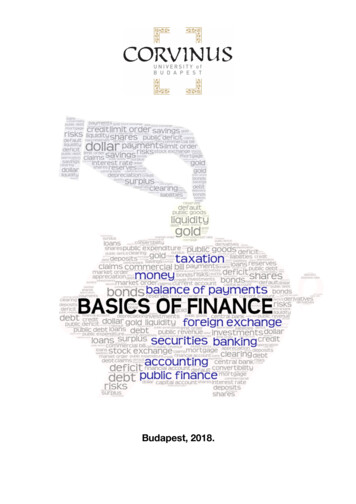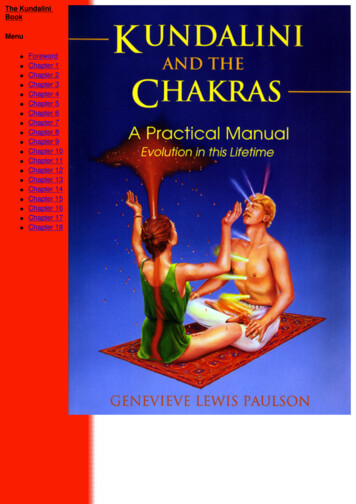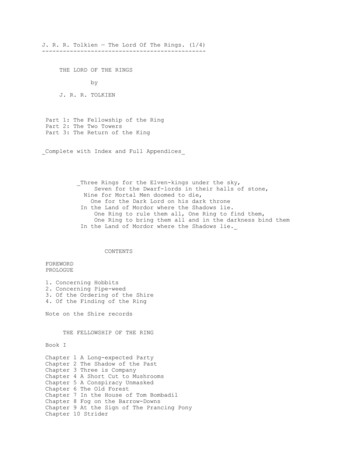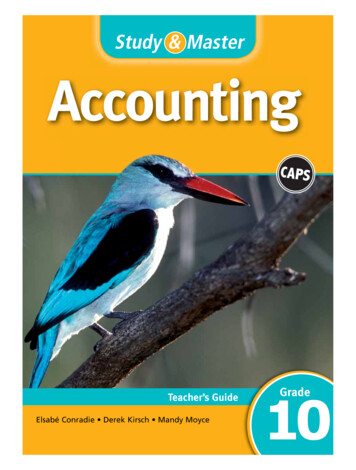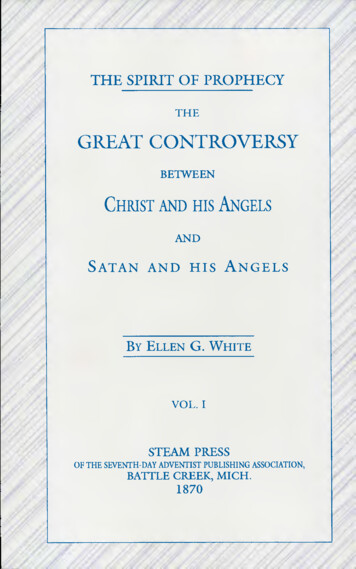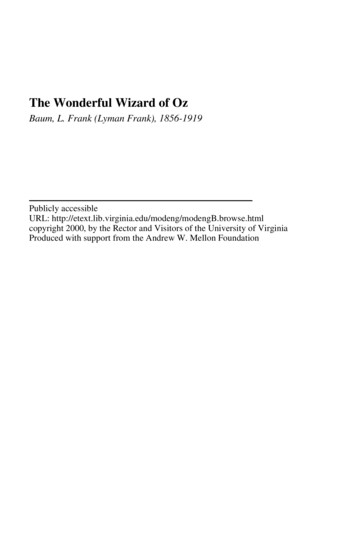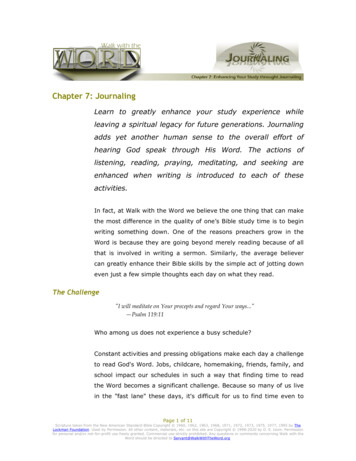
Transcription
Chapter 7: JournalingLearn to greatly enhance your study experience whileleaving a spiritual legacy for future generations. Journalingadds yet another human sense to the overall effort ofhearing God speak through His Word. The actions oflistening, reading, praying, meditating, and seeking areenhanced when writing is introduced to each of theseactivities.In fact, at Walk with the Word we believe the one thing that can makethe most difference in the quality of one’s Bible study time is to beginwriting something down. One of the reasons preachers grow in theWord is because they are going beyond merely reading because of allthat is involved in writing a sermon. Similarly, the average believercan greatly enhance their Bible skills by the simple act of jotting downeven just a few simple thoughts each day on what they read.The Challenge"I will meditate on Your precepts and regard Your ways."—Psalm 119:11Who among us does not experience a busy schedule?Constant activities and pressing obligations make each day a challengeto read God's Word. Jobs, childcare, homemaking, friends, family, andschool impact our schedules in such a way that finding time to readthe Word becomes a significant challenge. Because so many of us livein the "fast lane" these days, it's difficult for us to find time even toPage 1 of 11Scripture taken from the New American Standard Bible Copyright 1960, 1962, 1963, 1968, 1971, 1972, 1973, 1975, 1977, 1995 by TheLockman Foundation. Used by Permission. All other content, materials, etc. on this site are Copyright 1998-2020 by D. E. Isom. Permissionfor personal and/or not-for-profit use freely granted. Commercial use strictly prohibited. Any questions or comments concerning Walk with theWord should be directed to Servant@WalkWithTheWord.org.
read God's Word, much less find the necessary time to reflect andmeditate on it.Yet, reading and meditating on God's Word on a regular basis isexactly what He wants us to do.No matter how hard it seems, God wants us to rearrange ourschedules and prioritize our lives in such a way that we find the timenecessary to receive a blessing from His Word.King David carried the weight of a nation on his shoulders. When hewas not out fighting battles with Philistines, he was in his Jerusalemheadquarters making strategic plans for his country and his people.Yet, in spite of his busy schedule, he set aside time for the Word ofGod. Not only did he read and study God's Word, he meditated on it:"My eyes anticipate the night watches, that I may meditate on Yourword."—Psalm 119:148Meditating on the WordIf you have embarked on the Walk with the Word Scripture ReadingPlan, you have no doubt been blessed with a simple, easy method forreading through God's Word entirely in just over 3 years. Most likelyyou are gaining valuable knowledge about the Bible from thenumerous learning opportunities available through the church— theSunday School study, the message from the pulpit, the midweek smallgroup Bible study. It's astonishing how much we can learn about Godand His plan for our lives simply by reading His Word!Reading God's Word on a regular basis is a good thing to do. God'sWord provides knowledge. Knowledge is important because it is thebasis for knowing truth. Knowledge helps us to understand God'sPerson, God's ways, and God's interaction in human history. And God'sWord helps to understand ourselves.Page 2 of 11Scripture taken from the New American Standard Bible Copyright 1960, 1962, 1963, 1968, 1971, 1972, 1973, 1975, 1977, 1995 by TheLockman Foundation. Used by Permission. All other content, materials, etc. on this site are Copyright 1998-2020 by D. E. Isom. Permissionfor personal and/or not-for-profit use freely granted. Commercial use strictly prohibited. Any questions or comments concerning Walk with theWord should be directed to Servant@WalkWithTheWord.org.
itating on God's Word.Reading for reading's sake can easily become nothing more than theaccumulation of facts or a spiritual discipline that needs to becompleted. One of the dangers of a Scripture reading plan whichmoves rapidly through the Bible is that little time will be given forreflection and meditation, much less personal application.To meditate on God's Word means to reflect on it. To reflect on God'sWord is to think something through in its entirety; to ponder, toscrutinize, to "knead" something through. It's during reflection that wecome to the point of personalizing God's Word; that is, we begin to askthe question, "What does this mean to me?"It's through meditation and reflection on God's Word that theknowledge and facts which come from our reading begin to take onreal substance; that is, they become personally relevant to us. KingDavid didn't just read God's Word. He wrote,"I will meditate on Your wonders"—Psalm 119:78Overview of JournalingJournaling is a splendid way to help us learn to meditate and reflect onGod's Word, as well as make personal application.Many people do not realize this, but David's psalms (songs) are arecord of his meditation and reflection on God, His Word and Hisworks. Throughout Psalm 119, for example, David frequently refers toGod's laws, God's ordinances, His precepts, His ways, His testimonies,His commandments and His statutes. He used the gift God gave himfor song by writing down his thoughts and insights. Some of thepsalms are very personal, reflecting some difficult issues he was facingat the time. Other psalms are majestic and inspirational, reflecting onthe wonders of God. All of David's psalms have one thing in common,Page 3 of 11Scripture taken from the New American Standard Bible Copyright 1960, 1962, 1963, 1968, 1971, 1972, 1973, 1975, 1977, 1995 by TheLockman Foundation. Used by Permission. All other content, materials, etc. on this site are Copyright 1998-2020 by D. E. Isom. Permissionfor personal and/or not-for-profit use freely granted. Commercial use strictly prohibited. Any questions or comments concerning Walk with theWord should be directed to Servant@WalkWithTheWord.org.
however; they reflect what the Holy spirit was putting in his heart.Through the divine inspiration of the Holy spirit, David's "journals"become Scripture.Not everyone can write psalms like David. But most of us can writesomething. Most of us are capable of writing at least a sentence or twoabout what God is putting on our hearts.Writing what God is putting on our hearts— particularly as it relates toHis Word— is what journaling is all about.Recording one's thoughts in a journal is unlike writing in a diary.Diaries provide a detailed record of daily activities and events, whatgood or bad things happen to us, or what experiences we're having.Journaling is different, however. Journaling is a method of recordingone's thoughts, one's feelings, one's insights into things. Whereasdiaries are event oriented, journals are thought oriented. Of course, anabsolute distinction between a diary and a journal does not need to bemandated. Journal entries often record events, and diary entries,thoughts.Church history provides us with numerous examples of those ,AmyCarmichael, to name a few. One contemporary model is Jim Elliot.The Journals of Jim ElliotIn 1949, Jim Elliot graduated with highest honors from WheatonCollege in Illinois. He was someone who journaled extensively. Hiscomplete works may be found in The Journals of Jim Elliot, compiledand edited by his wife and author Elisabeth Elliot.On October 28, 1949, Elliot wrote these prophetic words in his journal:"One of the great blessings of heaven is the appreciation of heaven onearth. He is no fool who gives what he cannot keep to gain what hecannot lose."Page 4 of 11Scripture taken from the New American Standard Bible Copyright 1960, 1962, 1963, 1968, 1971, 1972, 1973, 1975, 1977, 1995 by TheLockman Foundation. Used by Permission. All other content, materials, etc. on this site are Copyright 1998-2020 by D. E. Isom. Permissionfor personal and/or not-for-profit use freely granted. Commercial use strictly prohibited. Any questions or comments concerning Walk with theWord should be directed to Servant@WalkWithTheWord.org.
Six years later, at the young age of twenty-eight, Jim Elliot and fourmissionary comrades were martyred by Auca Indians on the CurarayRiver in the jungles of Ecuador. Though Elliot was only twenty-eightwhen he died, he left for his wife, his only child Valerie, and all theworld a legacy of how God moves in the heart of a man through HisWord.*Perhaps most revealing in The Journals of Jim Elliot is a man in whomthe Word of God permeated every thought. Not a decision was madethat did not resound with the counsel of God's Word. It is through hisjournals that we gain insight into the spiritual character of the man.Most of Jim Elliot's journal entries were brief and reflected his thoughtsabout a particular section of Scripture. For example, this entry fromSeptember 9, 1948:"A verse stands out this morning in 1 Chronicles 12:8: Men who wishto do great things for a rejected king must be 'separated,' 'shielded' (inthe hold), 'strong,' 'skilled,' 'fearless' (as a lion in face) and 'swift.'This makes for a good outline (for teaching)."And this entry from December 10:"Psalm 62. Thankful for two new aspects of truth shown me thismorning, Father. Oh, that every day brought something new. Make itso, I pray. Psalm 62:1,2 and 5,6: The first describes the rest of thesoul's waiting in silence upon God, who is my salvation. The secondbeseeches the soul to rest so upon God, who is my expectation. The firstis settled; rest in salvation is secure and that is enough. 'I shall not begreatly moved' (perhaps a little wavering). The insertion of expectationhas removed any question of being moved. Teach me what thatmeans, Lord Jesus."And from December 13:"Psalm 65: Immanuel! Oh, the glory of a God who can come to thoseHe loves. Struck just now with the tremendous meaning of theincarnation. Think of it, thy God a wizened, weak babe in a manger ofPage 5 of 11Scripture taken from the New American Standard Bible Copyright 1960, 1962, 1963, 1968, 1971, 1972, 1973, 1975, 1977, 1995 by TheLockman Foundation. Used by Permission. All other content, materials, etc. on this site are Copyright 1998-2020 by D. E. Isom. Permissionfor personal and/or not-for-profit use freely granted. Commercial use strictly prohibited. Any questions or comments concerning Walk with theWord should be directed to Servant@WalkWithTheWord.org.
straw. The Almighty Jehovah—all of Him, in swaddling clothes. Andthere is not the aura in that stable which the artists paint there. No, itwas dark and the straw was prickly; the night, chill, God, born ofwoman! O Jesus, my Immanuel, how grateful I am that Thou art noless with me in common places than in more elevated ones."Because Jim Elliot journaled his thoughts as he poured over theScriptures, a legacy was left for generations of how God "spoke" tohim through the Word. From his journals, a living legacy was left forus to know the inner thoughts of a deeply committed Christian.Journaling is a time-tested and proven method of recording how Godinteracts with us in our everyday lives, as well as how we ourselvesinteract with Him. Journaling can be for the purpose of recordingobservations in Scripture, reflecting how God is dealing with us, or forrecording our prayers. Regarding Scripture, journaling serves theuseful purpose of assisting us in taking time to reflect and meditate onGod's Word.*(The entire story of the mission and martyrdom of the fivemissionaries in Ecuador is vividly told in Elisabeth Elliot's ThroughGates of Splendor.)Creating a Word JournalJournaling is an excellent way to get in touch with what God wants toteach us personally from His Word.When we sit before the Word of God, we come with an expectancy thatGod has something to say to us. We pray beforehand asking, "Lord,what do You have for me from Your Word today?" There is theexpectancy that the Holy Spirit will reveal to our spirits some truth theWord has for us personally, beyond simply gaining information orinsight. This process of personal revelation (theologically referred to as"illumination") through the Word is facilitated by journaling, for thereader purposes to write down that which the Spirit is speaking to theheart through the Word. (For more information about how to hear Godspeaking through His Word see the page so titled on the web site.).Page 6 of 11Scripture taken from the New American Standard Bible Copyright 1960, 1962, 1963, 1968, 1971, 1972, 1973, 1975, 1977, 1995 by TheLockman Foundation. Used by Permission. All other content, materials, etc. on this site are Copyright 1998-2020 by D. E. Isom. Permissionfor personal and/or not-for-profit use freely granted. Commercial use strictly prohibited. Any questions or comments concerning Walk with theWord should be directed to Servant@WalkWithTheWord.org.
(Some Bible scholars and teachers object to this approach to Biblereading. They contend that it is improper for the reader to ask thequestion, "What does this mean to me?" when reading Scripture. Theyargue that to interpret Scriptures correctly, we must instead ask thequestion, "What was the author's intent in writing this?" and we musttake into consideration to whom the author was writing before makingan interpretation. This objection is a valid one if the discussioninvolves proper methods of interpretation of Scripture. But interpretingScripture is quite different from personally applying Scripture. TheBible was written for us; for each and every believer who comes faceto-face with the Word of God. Exodus 12:26 states, "And when yourchildren say to you, 'What does this rite mean to you?' you shallsay." [See also Exod. 13:8, Deut. 4:9; 6:20.] That someone mightmake an inappropriate application is possible, but because there is arisk does not mean that no attempt at personal application should bemade at all!)Sometimes God speaks to us concerning personal issues we aredealing with, or emotional struggles that overwhelm us. Other times,the Lord provides a specific answer to a problem we are dealing with.Or, the Word may open our minds to something we're failing to do asa Christian, or as a parent, or as a son or daughter. One of thebenefits of journaling is that it slows the reading process down,allowing time for meditation and reflection, recording what God istelling our hearts through His Word.Journaling does not have to be pages and pages of stream ofconsciousness, although for some, that may become a wonderfulsource of inspiration or creativity. Most people, however, have tightschedules and can afford to write only a brief paragraph or two. Evenone sentence is worthwhile if it reflects what the Word has inscribed onthe heart.Page 7 of 11Scripture taken from the New American Standard Bible Copyright 1960, 1962, 1963, 1968, 1971, 1972, 1973, 1975, 1977, 1995 by TheLockman Foundation. Used by Permission. All other content, materials, etc. on this site are Copyright 1998-2020 by D. E. Isom. Permissionfor personal and/or not-for-profit use freely granted. Commercial use strictly prohibited. Any questions or comments concerning Walk with theWord should be directed to Servant@WalkWithTheWord.org.
The key to good journaling from the Word is to record what God'sWord is saying to your heart.The point in journaling, however, is write something down. That way,more thought will be given to a key word in the chapter or aparticularly meaningful verse. The secret to journaling is to find theverse or phrase that has particular meaning to you at the moment andwrite about what it means to you.By doing this, the Word of God becomes personally meaningful andapplicable and the reader comes away with the rightful impression,"God spoke to me today.""Your word is a lamp to my feetAnd a light to my path."—Psalm 119:105Leaving a Legacy"The unfolding of Your words gives light;It gives understanding to the simple."—Psalm 119:130A "legacy" is defined as "a gift.left to someone.," and "anythinghanded down from the past, as from an ancestor." Jim Elliot's journalsare a legacy for generations to come. Any believer who journals leavesa spiritual legacy, and parents can leave a lasting spiritual legacy fortheir children.Take, for example, a Christian parent. Children learn most of theirspiritual values from their parents; therefore, parents are to be rolemodels for the way they want their children to grow up spiritually. Asthe child grows and learns spiritual truths from the parent, they alsolearn about the Bible. As they grow older and desire to learn ommentaries, dictionaries, encyclopedias and other helps to explainthe Bible.Page 8 of 11Scripture taken from the New American Standard Bible Copyright 1960, 1962, 1963, 1968, 1971, 1972, 1973, 1975, 1977, 1995 by TheLockman Foundation. Used by Permission. All other content, materials, etc. on this site are Copyright 1998-2020 by D. E. Isom. Permissionfor personal and/or not-for-profit use freely granted. Commercial use strictly prohibited. Any questions or comments concerning Walk with theWord should be directed to Servant@WalkWithTheWord.org.
There is an abundance of commentaries on the Bible, but there are nospiritual commentaries on you, the child's parent.Thus, a child is left without a written record of how God and His Wordtouched the lives and hearts of his or her parents.Practically speaking, parents and children are not together enough forthe child to know how God is working in every facet of the parent'slife. Even families who have daily devotions together are rarelyexposed to the parents' inner thoughts. Children are usually not awareof their parents' personal struggles, tough decisions, burdens ofprayer, and occasional crisis that the parent must endure, much lesshow God provides answers, guidance and comfort from His Word.Children are often protected from such trials and afflictions, as well aspersonal temptations that the parent might face. Therefore, childrenrarely have an opportunity to see how exactly and in what manner theWord of God is "fleshed out" in the life of the parent. In other words,there is no recorded spiritual commentary on the parent.This is where leaving a legacy through journaling comes in. As parentsjournal daily how God's Word speaks to the heart, a legacy is left fortheir children. Wouldn't it be a surprise— and a great value— if ongraduation day, or as a wedding present, parents presented to theirson or daughter a spiritual commentary on how God spoke to themover the years of their growing up? Done consistently through theBible, a complete commentary could be presented that would remainlong after the parent passed away.And what about future generations? What a blessing it would be forthat son or daughter to show the journal to their own children and say,"Here is a spiritual commentary on the spiritual life of my parents andhow God spoke to them through the Bible."For the next Christian generation, few things would be of greatertreasure than the spiritual legacy of their parents' walk in the Word.Page 9 of 11Scripture taken from the New American Standard Bible Copyright 1960, 1962, 1963, 1968, 1971, 1972, 1973, 1975, 1977, 1995 by TheLockman Foundation. Used by Permission. All other content, materials, etc. on this site are Copyright 1998-2020 by D. E. Isom. Permissionfor personal and/or not-for-profit use freely granted. Commercial use strictly prohibited. Any questions or comments concerning Walk with theWord should be directed to Servant@WalkWithTheWord.org.
Leaving a legacy through journaling is not difficult. Here's how oneparent describes his habit of journaling:"I get up before anyone else in the house. I help myself wake up byfixing a fresh cup of coffee and taking a shower. Then I spend some timepr
—Psalm 119:148 Meditating on the Word If you have embarked on the Walk with the Word Scripture Reading Plan, you have no doubt been blessed with a simple, easy method for reading through God's Word entirely in just over 3 years. Most likely you are gain

